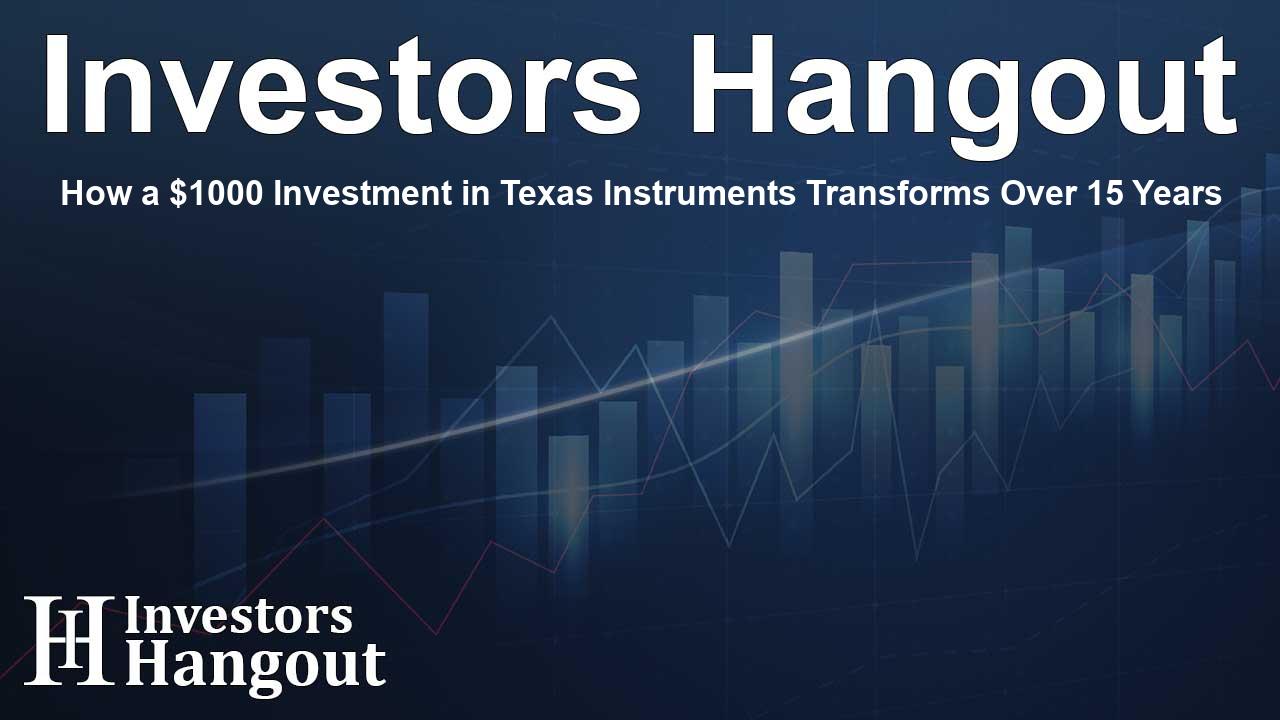How a $1000 Investment in Texas Instruments Transforms Over 15 Years

Understanding the Growth of Texas Instruments Investments
Texas Instruments (NASDAQ: TXN) has displayed impressive growth over the past 15 years, outpacing the market by an average of 2.3% annually. This translates to a robust average annual return of 14.17%, reflecting this company's strong position in the semiconductor industry. With a market capitalization now standing at an impressive $171.64 billion, Texas Instruments has solidified its reputation as a leader in technological innovation and financial performance.
The Impact of a $1000 Investment
Imagine investing $1000 in Texas Instruments stock 15 years ago. As of today, that initial investment would be worth approximately $7,441.55 based on the current trading price of $188.16. This remarkable growth exemplifies the profitability of investing in a well-performing company over the long term, and it highlights how strategic investments can significantly increase wealth through compounded interest.
Compounding Returns Explained
The primary takeaway from this scenario is the substantial impact of compounded returns on your investment journey. Compounding allows your profits to generate additional gains over time, which can dramatically amplify the value of your initial investment. This principle underscores why a long-term investment perspective can be extremely beneficial for investors.
Key Factors Contributing to Growth
Several elements have contributed to the sustained performance of Texas Instruments. As a company that designs and manufactures semiconductors, it plays a critical role in various applications, from consumer electronics to industrial systems. The ongoing demand for innovative technology ensures that Texas Instruments remains vital in its field, securing its future growth potential.
Looking Ahead: Future Prospects for Investors
As investors consider the potential of Texas Instruments, it is worth noting that the company continues to invest in research and development to enhance its product offerings. By focusing on cutting-edge technology and exploring new markets, Texas Instruments aims to maintain its competitive edge and growth trajectory. This ongoing commitment to innovation may further enhance its investment appeal in the years to come.
Frequently Asked Questions
What has been the average annual return of Texas Instruments over the past 15 years?
The average annual return of Texas Instruments has been 14.17%, outpacing the market by 2.3% annually.
If I had invested $1000 in TXN 15 years ago, how much would it be worth today?
An investment of $1000 in TXN stock 15 years ago would be worth approximately $7,441.55 today.
What factors contribute to the growth of Texas Instruments?
Texas Instruments' growth is attributed to its essential role in the semiconductor industry, robust return on investment, and ongoing investment in technology and innovation.
Why is compounding returns significant for investors?
Compounding returns allow initial investment gains to generate additional profits over time, significantly increasing the value of the investment in the long run.
What are the future prospects for Texas Instruments as an investment?
With a strong commitment to research and development and an eye on new technology markets, Texas Instruments is well-positioned for future growth, making it an attractive option for investors.
About Investors Hangout
Investors Hangout is a leading online stock forum for financial discussion and learning, offering a wide range of free tools and resources. It draws in traders of all levels, who exchange market knowledge, investigate trading tactics, and keep an eye on industry developments in real time. Featuring financial articles, stock message boards, quotes, charts, company profiles, and live news updates. Through cooperative learning and a wealth of informational resources, it helps users from novices creating their first portfolios to experts honing their techniques. Join Investors Hangout today: https://investorshangout.com/
Disclaimer: The content of this article is solely for general informational purposes only; it does not represent legal, financial, or investment advice. Investors Hangout does not offer financial advice; the author is not a licensed financial advisor. Consult a qualified advisor before making any financial or investment decisions based on this article. The author's interpretation of publicly available data shapes the opinions presented here; as a result, they should not be taken as advice to purchase, sell, or hold any securities mentioned or any other investments. The author does not guarantee the accuracy, completeness, or timeliness of any material, providing it "as is." Information and market conditions may change; past performance is not indicative of future outcomes. If any of the material offered here is inaccurate, please contact us for corrections.